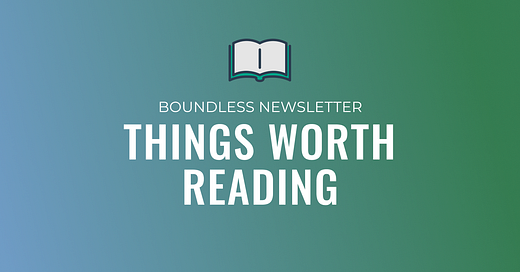Greetings friends. It’s my 4-year anniversary of self-employment today and to celebrate I went for a bike ride, read a bunch of stuff, shot some videos for a freelancing course I’m creating, and watched some mid-day Netflix.
As mentioned last week, I’ll be sending the occasional Boundless Reads mid-week. Expect these every other week or so. Hit the button to comment, ask questions or share your goodreads from the week.
1. On The Writing Part | Freddie deBoer
I’ve become less ashamed of writing and less afraid to say I love doing it. Hence, this quote really resonated:
But the stance of “I don’t take what I do seriously and I think caring about it is funny” is no defense against anything. This world is a tough place, we’re all struggling for meaning, we have to pay the bills and we’d like to find some way to do it that feels like it matters. So if you find something you think you’re good at and you enjoy, why not admit that it’s important to you, that you very much do care?
2. Enough Overwork | Rosie Spinks
I spoke with Rosie Spinks last month who has been on her own journey off the default path about the conversations I’ve had with many people throughout the pandemic:
“Work is very central to our lives and people are confused when they start to feel it might not be,” Millerd, who is American, said from Taiwan, where he lives with his wife. “The people I speak to often haven’t even told their spouse they’re suffering and questioning things. Because what they’re sensing is if they follow this train of ideas they might have to blow up their life.”
3. How To Not Let Work Explode Your Life | The School of Life
Long but fascinating take on the modern state of work and why it seems to dominate our lives. The author points to many points in history in which things were not quite this way. I thought one of the most interesting things it noted was that many people learn to section off work from the rest of their life (something I noticed when I talk to people about work is that they rarely tell their spouses what they tell me):
It’s hard to get your partner to really understand what your experience is like (and they may very likely be feeling the same way about you and their work). After a tricky day (or a tricky week) the tension has built up; the worries are circulating, work-related ideas fill one’s mind. All this preoccupation expresses itself in a range of not very endearing symptoms: grunting, sighing, brooding silence and a short-fused temper. The most innocuous sounding question ’how was your day?’ can elicit a growl or an explosion; a tiny irritation at home feels like this: one is already filled up with stress and irritation; a single drop more and a spill is inevitable.
4. The Anxiety Of Influencers (Harpers)
This quote from a professor writing about his experience in TikTok influencers houses during the pandemic stood out:
As naïve as it might seem, part of the reason I had become an English professor was that I believed I could influence, in however small a way, the shape of the next generation. Had you caught me in a more saccharine mood, I might have said that I was in the business of cultivating citizens, that the university was the linchpin of preserving the democratic tradition. And yet it was precisely this idea of a liberal-arts education that had been steadily eroded over the past decade, under the growing (and dubious) consensus that our students weren’t so much human beings with complex, variegated histories but potential members of the job market with certain workplace deficiencies—that the threshold into adulthood should be devoted to learning how to compete in an increasingly vicious economy. A few years ago, our Republican governor proposed amending the Wisconsin state system’s mission statement to suggest that the university’s purpose wasn’t to “seek the truth” or “improve the human condition,” but was instead, according to the legislature, “to meet the state’s workforce needs.”
5. The Texas Mask Mystery
Derek Thompson has probably been the best mainstream writer outside of Zeynep Tufekci during the pandemic
Yet another explanation is that Abbott’s decision didn’t matter because nobody changed their behavior. According to the aforementioned Texas paper, Abbot’s decision had no effect on employment, movement throughout the state, or foot traffic to retailers. It had no effect in either liberal or conservative counties, nor in urban or exurban areas. The pro-maskers kept their masks on their faces. The anti-maskers kept their masks in the garbage. And many essential workers, who never felt like they had a choice to begin with, continued their pre-announcement habits.The governor might as well have shouted into a void.
6. Involution In China | New Yorker
Others have adopted coping mechanisms similar to those of Silicon Valley dropouts: quitting their jobs, joining remote communes, setting up Chinese versions of Burning Man, and developing a “Buddhist” (that is, a chilled-out and laissez-faire) approach to life. Some young Chinese have embraced sang—an attitude of sardonic apathy and nihilism. “I wanted to fight for socialism today,” Zhao Zengliang, a twenty-seven-year-old sang Internet personality, wrote in a representative post. “But the weather is so freaking cold that I’m only able to lay on the bed to play on my mobile phone.”
7. The Chinese Typewriter
A story of IBM’s Chinese Typewriter and the US immigrant who memorized hundreds of characters as she toured around with IBM promoting a product that never quite connected with the Chinese speaking population.
Thoughts? Goodreads? Random things on your mind?
I did a soft launch of a short self-paced course I’m going to launch next month on Freelancer Basics. It will be $29 until 10-20 people buy it and then it will be $49.







Hey Paul. This resonated with me. I have found as I have opened up to my spouse, with my insecurities and my "convictions", (aka the things I don't know and the things I feel convinced of) it does tend to blow up our view of what our work should look like. But when we work together on our shared view of the future of our work and how it should change, it tends to open up more slowly and more gently than we had feared. I am not saying that fear doesn't keep us stuck, but sharing the struggle makes it easier to manage. When I read your update this morning it solidified something in me ... (made me more ready to let go) where I was still harboring some resistance. Thanks as always, John